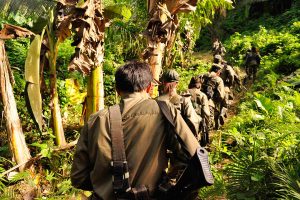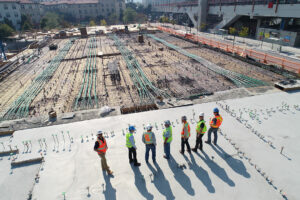PHL communists won’t declare holiday ceasefire

ARMED members of the Philippine communist movement will not declare a ceasefire with government forces this holiday season, citing alleged threats to local communities.
“There is absolutely no reason to declare a ceasefire to mark the holidays and the upcoming 54th Party anniversary,” the Communist Party of the Philippines (CPP) said in a statement on Monday.
The CPP said its armed wing, the New People’s Army (NPA), may launch tactical offensives against state forces who continue to operate in areas where there are business projects being opposed by local communities.
It cited mining operations, expansion of plantations, and foreign-funded infrastructure projects including dams and roads, among others.
The communist leadership also cited violations of human rights and international humanitarian law allegedly committed by state forces.
“The Central Committee, hereby, directs the NPA to actively fight and frustrate the AFP’s (Armed Forces of the Philippines’) campaign of armed suppression,” it said.
On Dec. 13, AFP spokesperson Medel M. Aguilar said they would likely declare a suspension of offensive military operations and “move to active defense, especially in areas where the insurgents are already weak.”
“We pray that the insurgents will also be allowed to go to their families and think about their future,” he told reporters, based on a report published by state-run Philippine News Agency.
The Philippine government under former president Rodrigo R. Duterte pushed peace talks with the Maoist movement in 2016, with Norway hosting the negotiations.
But the talks did not last long, with Mr. Duterte and his military officials citing attacks by NPA rebels. Negotiators representing the communist movement had belied Mr. Duterte’s claims.
The NPA has been waging one of the world’s longest-running insurgencies. It had significantly expanded across the impoverished country under the late dictator Ferdinand E. Marcos, whose son clinched a remarkable victory in the 2022 presidential election.
State officials have intensified their calls for NPA members to surrender to the government after the death on Dec. 16 of CPP’s founding chairman, Jose Maria Sison, who had been living in exile in the Netherlands since 1987, or a year after the older Marcos’ two-decade rule was ended by a popular uprising backed by members of the military establishment.
NEW THREATSThe AFP marked its 87th anniversary on Monday, with President Ferdinand R. Marcos, Jr. reiterating his commitment to modernize the country’s armed forces.
“The armed forces needs to have in its arsenal the capabilities to effectively combat threats and to secure the country — all its more than 7,000 islands and all its features,” Mr. Marcos said in a speech at the AFP anniversary event.
The president called the Maoist rebels “terrorist” and said they “hamper the delivery of government services and infrastructure development.”
The Philippine leader, meanwhile, said there are new security challenges that do “not recognize borders”
“We must continue to work with our neighbors, our allies, partners, and friends to address mutual security concerns.”
He said climate change-related disasters are among the security challenges that the AFP need to confront.
“Apart from climate change-related disasters, we are now confronted with a different and complex security environment, it brings with it new challenges that require us to adapt.” — Kyle Aristophere T. Atienza




